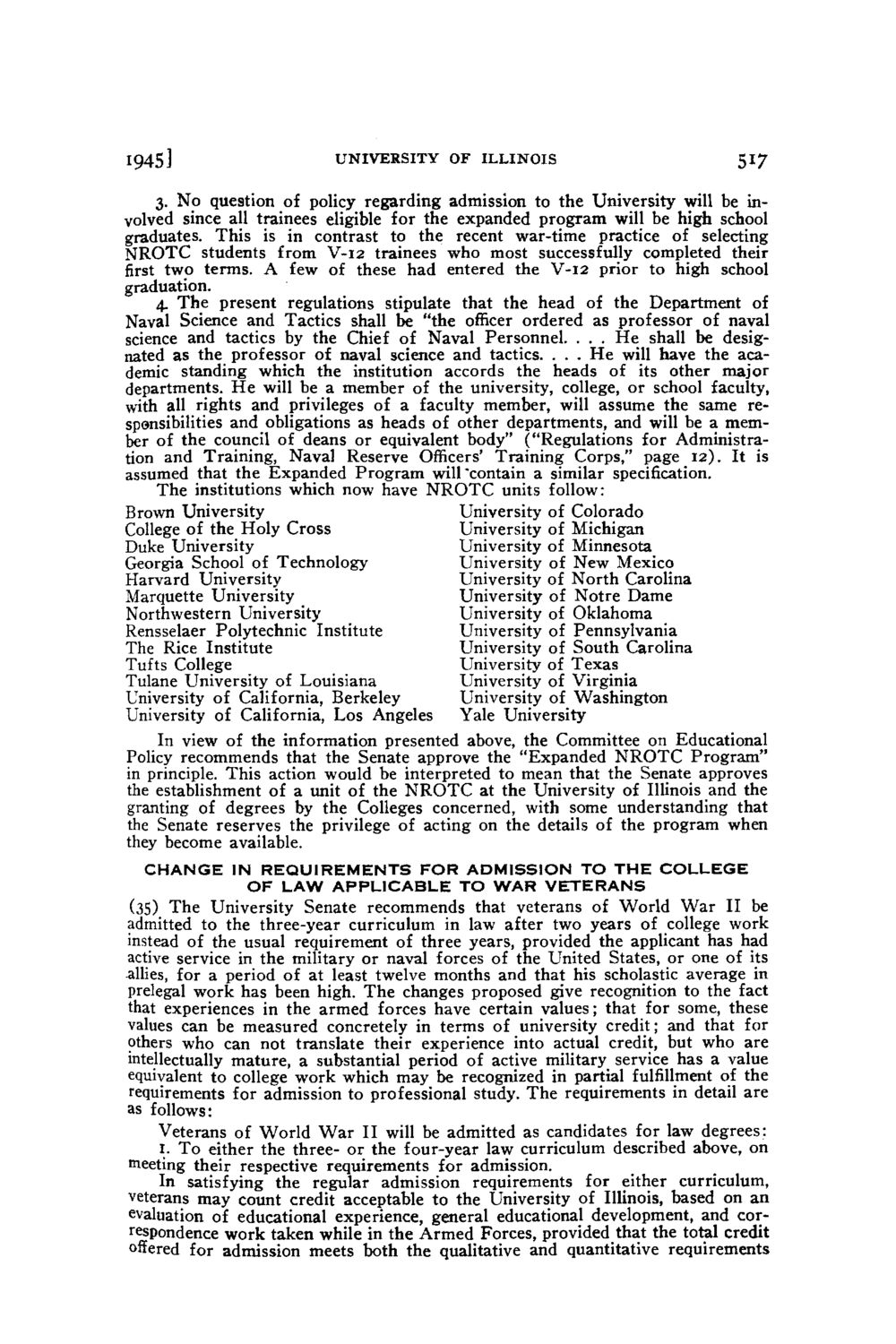| |
| |
Caption: Board of Trustees Minutes - 1946
This is a reduced-resolution page image for fast online browsing.

EXTRACTED TEXT FROM PAGE:
1945] UNIVERSITY OF ILLINOIS 517 3. No question of policy regarding admission to the University will be involved since all trainees eligible for the expanded program will be high school graduates. This is in contrast to the recent war-time practice of selecting N R O T C students from V-12 trainees who most successfully completed their first two terms. A few of these had entered the V-12 prior to high school graduation. 4. T h e present regulations stipulate that the head of the Department of Naval Science and Tactics shall be "the officer ordered as professor of naval science and tactics by the Chief of Naval Personnel. . . . H e shall be designated as the professor of naval science and tactics. . . . H e will have the academic standing which the institution accords the heads of its other major departments. H e will be a member of the university, college, or school faculty, with all rights and privileges of a faculty member, will assume the same responsibilities and obligations as heads of other departments, and will be a member of the council of deans or equivalent body" ("Regulations for Administration and Training, Naval Reserve Officers' Training Corps," page 12). It is assumed that the Expanded Program will "contain a similar specification. The institutions which now have N R O T C units follow: Brown University University of Colorado University of Michigan College of the Holy Cross University of Minnesota Duke University University of New Mexico Georgia School of Technology University of North Carolina Harvard University University of Notre Dame Marquette University University of Oklahoma Northwestern University University of Pennsylvania Rensselaer Polytechnic Institute University of South Carolina The Rice Institute University of Texas Tufts College University of Virginia Tulane University of Louisiana University of Washington University of California, Berkeley University of California, Los Angeles Yale University In view of the information presented above, the Committee on Educational Policy recommends that the Senate approve the "Expanded N R O T C P r o g r a m " in principle. This action would be interpreted to mean that the Senate approves the establishment of a unit of the N R O T C at the University of Illinois and the granting of degrees by the Colleges concerned, with some understanding that the Senate reserves the privilege of acting on the details of the program when they become available. CHANGE IN R E Q U I R E M E N T S FOR ADMISSION T O THE C O L L E G E O F LAW A P P L I C A B L E T O WAR V E T E R A N S (35) T h e University Senate recommends that veterans of World W a r II be admitted to the three-year curriculum in law after two years of college work instead of the usual requirement of three years, provided the applicant has had active service in the military or naval forces of the United States, or one of its allies, for a period of at least twelve months and that his scholastic average in prelegal work has been high. T h e changes proposed give recognition to the fact that experiences in the armed forces have certain values; that for some, these values can be measured concretely in terms of university credit; and that for others who can not translate their experience into actual credit, but who are intellectually mature, a substantial period of active military service has a value equivalent to college work which may be recognized in partial fulfillment of the requirements for admission to professional study. T h e requirements in detail are as follows: Veterans of World W a r I I will be admitted as candidates for law degrees: 1. T o either the three- or the four-year law curriculum described above, on meeting their respective requirements for admission. In satisfying the regular admission requirements for either curriculum, veterans may count credit acceptable to the University of Illinois, based on an evaluation of educational experience, general educational development, and correspondence work taken while in the Armed Forces, provided that the total credit offered for admission meets both the qualitative and quantitative requirements
| |